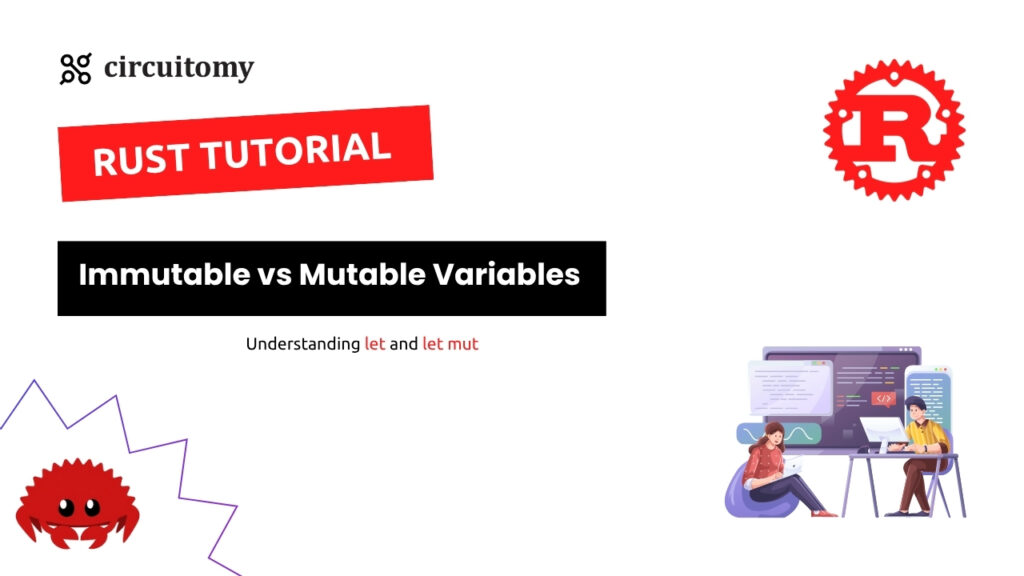Immutable (let) and Mutable (let mut)
The choice between using immutable (let) and mutable (let mut) variables in Rust depends on whether the value of the variable needs to change during the program’s execution. Here’s a guide to help you decide:
When to Use Immutable Variables (let)
1. Value Doesn’t Change
• If the value of the variable is meant to stay the same after it’s initialized, use let.
• Immutable variables are the default in Rust because they promote safety and predictability.
Example
fn main() {
let pi = 3.14159; // Value of pi doesn't change
let radius = 5;
let area = pi * (radius * radius) as f64;
println!("Area of the circle: {}", area);
}2. Thread Safety
• Immutable variables are inherently thread-safe because they cannot be modified, preventing data races in concurrent programs.
3. Code Clarity
• Immutable variables make it clear to readers of the code that the value won’t change, which improves readability and reduces the risk of bugs.
4. Performance
• Immutability can sometimes enable the compiler to perform optimizations that aren’t possible with mutable variables.
When to Use Mutable Variables (let mut)
1. Value Changes Dynamically
• Use let mut when the value needs to be updated or reassigned during the program’s execution.
fn main() {
let mut count = 0; // Value will change
println!("Initial count: {}", count);
count += 1; // Updating the value
println!("Updated count: {}", count);
}2. State Tracking
• Mutable variables are useful when tracking state, such as counters, accumulators, or flags.
3. Input and Output
• When processing input or accumulating results, mutable variables are often required.
Example
fn main() {
let mut total = 0;
for i in 1..=10 {
total += i; // Accumulating sum
}
println!("Sum of numbers from 1 to 10 is: {}", total);
}Performance in Loops
• In loops or iterative algorithms, mutable variables can avoid the overhead of creating new variables.
Immutable vs Mutable: Key Differences
| Feature | Immutable (let) | Mutable (let mut) |
| Value Modifiability | Cannot change after the assignment | Can change after the assignment |
| Safety | Prevents accidental modification | Risk of unintended changes |
| Use Case | Constants or fixed values | Changing, evolving values |
| Thread Safety | Thread-safe by default | Requires extra care in threads |
When to Prefer Immutable Over Mutable
• Default to Immutable:
• Always start with let (immutable) unless you have a clear need for let mut.
• Avoid Unintended Changes:
• Immutability helps catch logical errors early since Rust prevents accidental modifications.
• Readability and Maintenance:
• Immutable variables make code easier to understand and maintain.
Combination Example
A scenario where both immutable and mutable variables are used:
fn main() {
let price_per_item = 25.0; // Immutable, doesn't change
let mut total_cost = 0.0; // Mutable, accumulates total
for quantity in 1..=3 {
// Update total_cost
total_cost += price_per_item * quantity as f64;
}
println!("Total cost for items: {}", total_cost);
}Rule of Thumb
1. Use immutable variables (let) for values that don’t change.
2. Use mutable variables (let mut) when modifications are necessary.
3. Favor immutability whenever possible to write safer, more predictable code.
Which is More Memory Efficient?
In terms of memory efficiency, immutable variables are generally more memory-efficient compared to mutable ones
• Immutable variables tend to be more memory-efficient in Rust because they can be shared across different parts of the program without duplication, and the system can optimize for them better.
• Mutable variables can lead to less efficient memory usage, especially when frequent mutations are needed or if cloning is involved. However, in situations where frequent changes are required, mutable variables can avoid the overhead of cloning and copying, thus providing better flexibility.
Recommendation: In Rust, use immutable variables as much as possible for better memory efficiency, and only use mutable variables when necessary. Rust’s borrowing system allows for efficient memory usage even with references, making immutability a generally better choice for memory efficiency.
